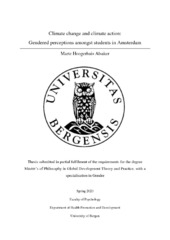| dc.description.abstract | Research objectives: This study sought to explore how male and female Dutch students perceive the threat of climate change and to what extent their perceptions are related to gender. Additionally, this study sought to explore the gendered aspects of the participants’ climate action, and the role their gender identity might play in influencing their behaviour. Data collection and analysis: This is a qualitative study. Research was conducted through semi-structured individual interviews. The project draws on a phenomenological approach to explore what the students know about climate change and gender, and how they know it. The data was coded in NVivo and analysed by using thematic analysis. Findings: This study found that the participants displayed various levels of knowledge about climate change, and what action can be taken against it. In terms of gender, it became clear that at first glance, there were no obvious gender disparities in what the participants know. Rather, gender emerged in underlying ways through the participants’ behaviour. There were some areas in which gender appeared as more important than others, including through authority, food habits and transportation. The findings revealed that whilst there generally were few gender differences, the male participants did claim to feel pressure to conform to masculine ideals in ways which embraces non-climate friendly behaviour, for example through the continued consumption of meat. The female participants did not claim to feel such pressures in relation to climate change. Furthermore, it is important to note that there were tensions in how the participants spoke about both climate change and gender. Often their perceptions would not coincide with their behaviour, or they would express one opinion when discussing a topic in a general sense, and then alter their answer when being asked more specifically. Conclusion: The findings indicate that whilst there were few gender differences, women might be expected to act more sustainably. This is because climate action in terms of a plant based diet, or more sustainable means of travel, does not threaten a woman’s gender identity to the same extent that it may threaten that of men. This relates back to masculine ideals materialising through food habits and transportation. The female participants do not seem to feel such pressures yet, however. Furthermore, the tensions that emerged can reflect how the participants struggle to discuss gender in a way which they had not prior to the interviews. It can also indicate that they do not always entirely agree with the internalised norms of their society, leading to an internal conflict in which they are unsure of what they know. | en_US |
